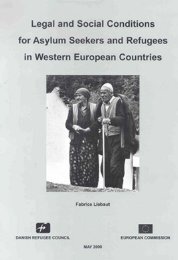Bulgaria - The social impact of seasonal migration
Bulgaria - The social impact of seasonal migration
Bulgaria - The social impact of seasonal migration
You also want an ePaper? Increase the reach of your titles
YUMPU automatically turns print PDFs into web optimized ePapers that Google loves.
4<br />
Executive Summary<br />
<strong>The</strong> report follows the main guidelines <strong>of</strong> the comparative research outline designed by<br />
IOM-Vienna: brief introduction to the problem from the point <strong>of</strong> view <strong>of</strong> introducing<br />
historical background, the statistical development over the past five years (1997 to<br />
2001), the legal and administrative provisions with regard to <strong>migration</strong> and <strong>migration</strong><br />
management, trying to find answers to the main question <strong>of</strong> the study: How does<br />
<strong>migration</strong> affect the local society in <strong>Bulgaria</strong> at this point <strong>of</strong> time?<br />
<strong>The</strong> report analyses both out-<strong>migration</strong> and in-<strong>migration</strong> trends, but in the <strong>Bulgaria</strong>n case<br />
what seems clear is that out-<strong>migration</strong> exceeds in-<strong>migration</strong>, thus e<strong>migration</strong> rather than<br />
im<strong>migration</strong> has bigger <strong>impact</strong> on the <strong>Bulgaria</strong>n society. <strong>The</strong> public discourse is<br />
dominated by concerns about brain-drain, the economic benefits from <strong>Bulgaria</strong>n<br />
migrants working abroad temporarily, the possibilities for exporting skilled labour<br />
legally, and the harm inflicted by returned asylum-seekers on <strong>Bulgaria</strong>'s image.<br />
Immigrants are not particularly visible yet, and concerns about their number, protection<br />
<strong>of</strong> their rights, xenophobia or their integration come rarely to the fore. That is why, in<br />
searching for the <strong>social</strong> <strong>impact</strong> <strong>of</strong> <strong>migration</strong> on the <strong>Bulgaria</strong>n society, the <strong>Bulgaria</strong>n team<br />
will pay more attention to out-<strong>migration</strong> than to in-<strong>migration</strong>.<br />
<strong>The</strong> report is based on secondary analysis <strong>of</strong> relevant literature (Appendix 1);<br />
normative documents, regulating <strong>migration</strong>; statistical and border police data about<br />
<strong>migration</strong> (Appendix 2); sociological surveys on potential <strong>migration</strong> and on the<br />
economic <strong>impact</strong> <strong>of</strong> <strong>migration</strong>; interviews with representatives <strong>of</strong> state institutions and<br />
NGOs dealing with <strong>migration</strong>, as well as with immigrants and emigrants (Appendix 3).<br />
Main conclusions and recommendations:<br />
I. Current <strong>migration</strong> trends differ significantly from the pre-1989 tendencies.<br />
As a whole, from 1880 to 1988, around 1 283 000 people emigrated from <strong>Bulgaria</strong>, while<br />
808 600 immigrated to the country. In that period, in-<strong>migration</strong> included mainly ethnic<br />
<strong>Bulgaria</strong>ns living on the territories <strong>of</strong> neighbouring countries, while the main waves <strong>of</strong><br />
out-<strong>migration</strong> were comprised mostly <strong>of</strong> ethnic minorities living in <strong>Bulgaria</strong>,<br />
predominantly ethnic Turks. <strong>The</strong> main reasons for both out- and in- <strong>migration</strong> were<br />
political. In-<strong>migration</strong> flows now include more refugees and foreign immigrants, while<br />
out-<strong>migration</strong> has no such clearly expressed ethnic pr<strong>of</strong>ile – it is characteristic for all the<br />
ethnic groups inhabiting <strong>Bulgaria</strong> nowadays. <strong>The</strong> main reasons for e<strong>migration</strong> now are<br />
economic.<br />
<strong>The</strong> historical heritage has the following consequences for the current <strong>migration</strong><br />
patterns:<br />
Firstly, the <strong>Bulgaria</strong>n community abroad is quite diversified, including different <strong>social</strong><br />
groups, with different ethnic origin and different motives for e<strong>migration</strong>. <strong>The</strong> notion <strong>of</strong><br />
different groups <strong>of</strong> <strong>Bulgaria</strong>ns living abroad has been embedded in the new law on<br />
<strong>Bulgaria</strong>ns living outside <strong>of</strong> <strong>Bulgaria</strong> (<strong>of</strong> 11 April 2000), which introduces the concept <strong>of</strong><br />
"<strong>Bulgaria</strong>n community abroad". <strong>The</strong> political use <strong>of</strong> the term “<strong>Bulgaria</strong>n community<br />
abroad” is helpful, but for analytical purposes and in the process <strong>of</strong> elaborating<br />
concrete policies, it has to be differentiated in order to explain the specific<br />
characteristics <strong>of</strong> the different groups which ought to be treated in a different political

















